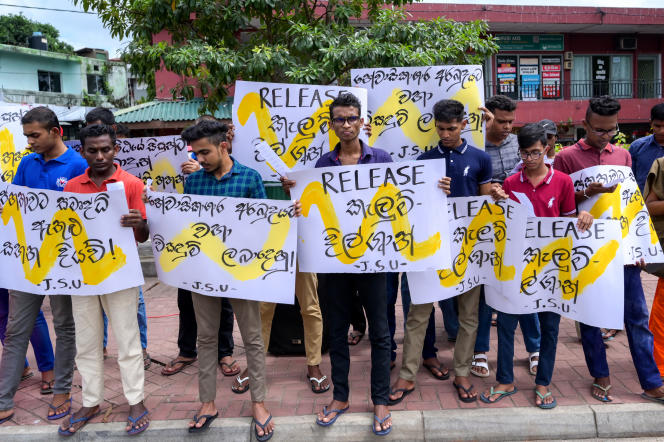The endless queues in front of Colombo’s service stations to obtain fuel or a gas canister have disappeared from the landscape, the electricity works without interruption, the seafront, the epicenter of the protest baptized the Aragalaya, (“ wrestling”) has regained its flirtatious appearance. There is an air of normalcy in the Sri Lankan capital, a year after a historic citizen protest forced the powerful Rajapaksa clan out of power. On July 13, 2022, President Gotabaya Rajapaksa sadly fled to Singapore. The images of Sri Lankans happily investing his residence, bathing in his pool, trying his bed, are now a thing of the past. The anger of Sri Lankans, which had erupted after months of deprivation due to disastrous management and abysmal debt, seems to have been muzzled. Ranil Wickremesinghe, Gotabaya Rajapaksa’s successor as President of the Republic, rules with an iron fist, nipping any attempt at protest in the bud using a draconian law on the prevention of terrorism.
The Head of State has been working for a year to restore public finances and stabilize the economy, which had hit rock bottom when the island, totally short of money, defaulted on its foreign debt (46 billion dollars, or 41 billion euros), on April 12, 2022. After several months of negotiations, the government concluded, in March, a rescue plan with the International Monetary Fund (IMF) for a loan of 2.9 billions of dollars, at the cost of drastic tax reforms demanded by the monetary institution: abolition of subsidies on water, electricity, fuel oil, increase in VAT and income tax, restrictions on imports, establishment of a floating system for the rupee, privatization of public enterprises, debt restructuring. The IMF is closely monitoring the implementation of the reforms. The $2.9 billion will be disbursed in nine installments over four years, and the institution will conduct a review every six months. The Central Bank stopped printing money.
All these austerity measures are hitting the middle class and the poor hard, already heavily hit by the health crisis due to Covid-19 and by the economic crisis. The purchasing power of the inhabitants has melted under the effect of inflation – 70% in 2022 – and the doubling of the prices of electricity and water, as well as the level of taxes. The impoverishment of the country is general. The United Nations estimates that 3.9 million people, or 17% of the population, are suffering from acute food insecurity. This figure rises to 42% among the population working in tea plantations. About 62% of households are forced to borrow, sell their assets, or cut spending on health and education. For the opposition, the IMF bailout is a bad deal, signed on the backs of the poor.
You have 72.35% of this article left to read. The following is for subscribers only.
